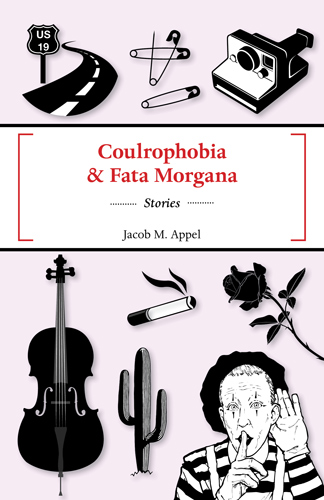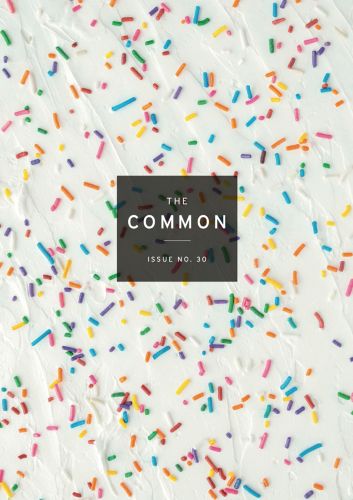Usually I’m well into reading a book before I have to look up a word. Not so with Coulrophobia & Fata Morgana. This time I hadn’t even opened the book. I thought maybe these were stories about ancient mythological characters, but Google informed me that coulrophobia is fear of clowns, and fata morgana is a form of mirage seen right above the horizon.
Usually I’m well into reading a book before I have to look up a word. Not so with Coulrophobia & Fata Morgana. This time I hadn’t even opened the book. I thought maybe these were stories about ancient mythological characters, but Google informed me that coulrophobia is fear of clowns, and fata morgana is a form of mirage seen right above the horizon.
With that out of the way, I turned to what’s inside the book: ten stories by Jacob M. Appel, who has published over 200 short stories, several books, won awards too numerous to list, and has five graduate degrees. This guy is also a physician, an attorney, a bioethicist, a teacher and on and on. I wonder when he has time to write. Nevertheless, he appears to never stop writing, and that’s a good thing for readers.
Appel’s stories focus primarily on relationships. In “Coulrophobia,” a young boy narrates that his father is the one with something to fear, this time in the character of a mime, and not because Simon the mime is scary. Dad rents a room to Simon and stepmom Sylvia perks up. All goes well for a while, “And we might have continued at that pace, too. To an eleven year old, at least, anything is possible. But then my stepmother started miming, and Simon stopped paying rent.”
“Fata Morgana” concerns Megan, her husband Josh, and a young man named Freyr. Pregnant Megan is more fixed on her smoking habit than her relationship with Josh. This plays out in the illusionary scenery of their honeymoon in Iceland:
A long chain of volcanic summits scattered along the horizon. The distant water mirrored their crests, making the mountains resemble oil tanks, and giant toy drums and, in one case, an ocean liner with three large smokestacks.
“They look so real,” said Megan.
“All an illusion,” said their guide. “Fata Morgana. The arctic mirage.”
Perhaps thoughts of cigarette smoke create a more personal mirage for Megan:
[ . . . ] the previous night she’d learned (the hard way!) that it was impossible to sleep off her cravings. She’d awoken several times from tobacco nightmares, ghastly hallucinations that she’d been smoking while unconscious. In one—the most vivid—she’d set fire to the bed.
But the relationship story that sticks in my head is a small telling toward the end of the book titled “Counting.” Appel successfully pits a beautiful woman and her mute husband against two naïve census takers in this highly original plot. See how we meet the woman:
She filled the small door frame and offered no place to look. There were her breasts, pushing against a tight cotton blouse, then her clear jade eyes and full lips, finally her legs most distinctive in their absence.
The legless woman’s ex-con husband is absorbed in decks of cards, and the couple is reluctant to be interviewed for the census. “So here’s the deal,” she said. “If my husband can build a card house to the ceiling, you go home empty handed. If he can’t, we answer your questions.” Things don’t quite pan out like you’d expect.
Several of Appel’s stories are told by women narrators, which Appel handles well. “The Butcher’s Music” finds two sisters dealing with two babies and a serious lack of good judgment. In “The Punishment,” a horrid child named Patzi grows into a grandmother you wouldn’t want to claim as your own. “Pollen” involves teenaged cousins Charlotte and Becky and the mixed bag of love and jealousy that drives their relationship.
All the stories are entertaining, though I predicted the ending of “Boundaries.” And I strongly disliked a pivotal person in “Saluting the Magpie,” but that might have been the author’s intention.
One of Appel’s current teaching positions is with Gotham Writers’ Workshop in New York City. In an article on Gotham’s website (writingclasses.com) he talks about a published story that was the “breakthrough event” in his career. It came after the story was previously rejected by 75 journals, including the one that later accepted it. We’re lucky he didn’t give up. Otherwise, almost 20 years later, we would not have access to the clever, easy reading in Coulrophobia & Fata Morgana.





